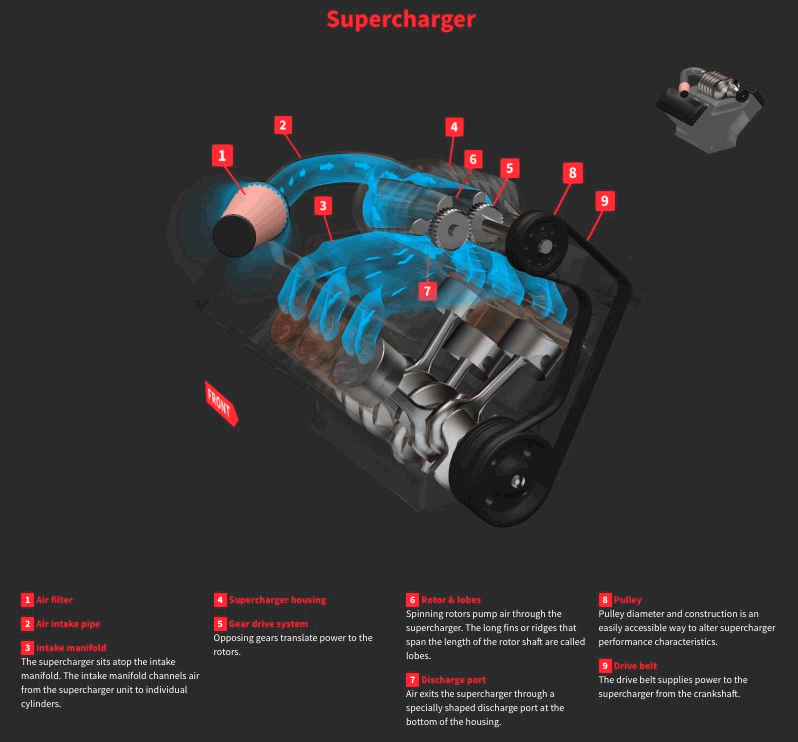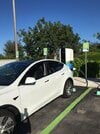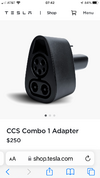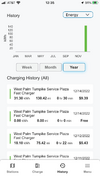I'm picking up a MYLR on Friday (ordered from existing inventory 2 days ago) and the Tesla mobile connector/charger I had ordered at the same time as the car still doesnt show as shipped. I'd like to get one extra anyways to keep with the car while one stays at home. I'm assuming that the charger didn't ship due to low inventory. Are there alternatives on Amazon that work well?
Welcome to Tesla Motors Club
Discuss Tesla's Model S, Model 3, Model X, Model Y, Cybertruck, Roadster and More.
Register
Install the app
How to install the app on iOS
You can install our site as a web app on your iOS device by utilizing the Add to Home Screen feature in Safari. Please see this thread for more details on this.
Note: This feature may not be available in some browsers.
-
Want to remove ads? Register an account and login to see fewer ads, and become a Supporting Member to remove almost all ads.
You are using an out of date browser. It may not display this or other websites correctly.
You should upgrade or use an alternative browser.
You should upgrade or use an alternative browser.
Alternatives to Tesla mobile connector?
- Thread starter Ymee
- Start date
Yes. The Tesla Mobile Connector can be fitted with a wide range of Level1 (120V) and Level 2 (240V) power plug adapters. The majority of the third-party equipment available from Amazon, eBay, etc. will have the option of supporting 120V charging using the NEMA 5-15 plug adapter and at least one 240V plug adapter (e.g., 6-20, 14-30, 14-50). Depending on where and how you plan to use the mobile equipment to charge (at home, when camping, traveling, etc.) the third-party solution may be adequate. (Every Tesla vehicle comes with a small accessory, the Tesla SAE J1772 adapter (or just called the J1772 adapter) that you would use to be able to charge using third-party (non-Tesla) Level 1 and Level 2 charging equipment. This includes using a public Level 2 charging station that are often found in public buildings, garages.
If your home was built recently you may already have a NEMA 14-50 receptacle for 240V/50A charging. There is almost certainly a NEMA 5-15 or 5-20 receptacle already located in the garage that you could use to charge with the correct power plug adapter.
Until you sort out your home charging needs you can use the Tesla Supercharger network or a public Level 2 charging station (download the Plugshare app onto your phone to locate nearby public charging stations.) You can also use Google Maps to located Electric Vehicle Charging, Tesla Superchargers (Tesla's high power DC charging network) and Tesla Destination Chargers (Level 2 fitted with a Tesla charging connector.)
If your home was built recently you may already have a NEMA 14-50 receptacle for 240V/50A charging. There is almost certainly a NEMA 5-15 or 5-20 receptacle already located in the garage that you could use to charge with the correct power plug adapter.
Until you sort out your home charging needs you can use the Tesla Supercharger network or a public Level 2 charging station (download the Plugshare app onto your phone to locate nearby public charging stations.) You can also use Google Maps to located Electric Vehicle Charging, Tesla Superchargers (Tesla's high power DC charging network) and Tesla Destination Chargers (Level 2 fitted with a Tesla charging connector.)
Last edited:
Thank you for such a detailed reply. Are there any particular 3rd party chargers that are recommended? I see so many no name Chinese brand level 2 chargers on Amazon. Don’t want to risk frying the charging system on my car. I was also told that it’s not a good idea to use super chargers to charge your battery all the time.
jsmay311
Active Member
I ordered a Mobile Connector back in September and I got an email notification that it had shipped 4 days later. So it not shipping 2 days after placing the order — especially if the order was placed on a weekend — doesn’t seem unusual at all. I don’t think it’s necessarily a sign of low inventory/availability.
And I personally wouldn’t get a third-party charger anyway. A comparable third-party EVSE will often cost more than a Tesla Mobile Connector, usually won’t work with multiple outlet adapters like the Mobile Connector does, you’ll have to use a J1772 adapter, and you won’t get the button on the handle that opens the charge port. There’s no upside as far as I can tell.
If you’re concerned about low inventory / shipping delays at Tesla, you could order a Tesla Mobile Connector off EBay. You’ll probably pay a bit more though.
And don’t worry about charging at Superchargers for just a few day or even weeks while you wait for your home chargers. A few Supercharging sessions won’t do any harm.
And I personally wouldn’t get a third-party charger anyway. A comparable third-party EVSE will often cost more than a Tesla Mobile Connector, usually won’t work with multiple outlet adapters like the Mobile Connector does, you’ll have to use a J1772 adapter, and you won’t get the button on the handle that opens the charge port. There’s no upside as far as I can tell.
If you’re concerned about low inventory / shipping delays at Tesla, you could order a Tesla Mobile Connector off EBay. You’ll probably pay a bit more though.
And don’t worry about charging at Superchargers for just a few day or even weeks while you wait for your home chargers. A few Supercharging sessions won’t do any harm.
howardnj
Member
There is no problem using superchargers. I'm on my first long distance road trip to Florida and used superchargers all the way down I95 charging to 90%Thank you for such a detailed reply. Are there any particular 3rd party chargers that are recommended? I see so many no name Chinese brand level 2 chargers on Amazon. Don’t want to risk frying the charging system on my car. I was also told that it’s not a good idea to use super chargers to charge your battery all the time.
Here is Florida FPL has 350kwh superchargers next to Tesla 250kwh superchargers that are cheaper than Tesla at $0.30 kwh but you need a CC1 adapter that I have.
Attachments
The majority of low end electric vehicle service equipment (everyone calls this the charger) is made off shore. I would check reviews by verified purchasers. I would avoid the least expensive, go with a brand that costs at or just over $200. Don't expect a full 3-year warranty with the off-brand EVSE, maybe just a 1 or 2 year warranty. Get one with a charging cord of at least 20 ft in length (some have short, i.e. 16 foot charging cords.) A 24/25 ft cord will provide more reach. At the end of the day the EVSE is just a fancy extension cord with a couple of relays, temperature sensors and a logic board. I am partial to ClipperCreek, also their low end offering branded AmazingE. (The Tesla Mobile Connector is a very good value, you should be able to receive an order for the Tesla Mobile Connector fairly quickly if not in stock when you want to purchase it. (The Tesla SAE J1772 adapter comes with the vehicle, you can purchase an additional/spare J1772 adapter for $45 (I paid $90 in 2020 for my spare J1772!)Thank you for such a detailed reply. Are there any particular 3rd party chargers that are recommended? I see so many no name Chinese brand level 2 chargers on Amazon. Don’t want to risk frying the charging system on my car. I was also told that it’s not a good idea to use super chargers to charge your battery all the time.
Supercharging won't damage the Tesla battery; Urban Superchargers (usually found in urban settings such as commercial/public parking garages) are a bit lower power (72kW) versus 120/150/250 kW at the V2 at V3 Superchargers. If you are concerned about Supercharging seek out an Urban Supercharger as the lower maximum power (72kW) is in theory less stressful on the battery.
exxxviii
Member
If you plan to keep your Tesla mobile charger in the car (what I did), then it makes a lot of sense to get a dedicated wall charger for your house. Ideally, that would be a Tesla charger, but you can use any one of the many popular and highly regarded J1772 chargers, including:Thank you for such a detailed reply. Are there any particular 3rd party chargers that are recommended? I see so many no name Chinese brand level 2 chargers on Amazon. Don’t want to risk frying the charging system on my car. I was also told that it’s not a good idea to use super chargers to charge your battery all the time.
- ChargePoint Home Flex
- Grizzl-E
- JuiceBox
- Wallbox
- Blink
- FLO Home X5
- etc.
Please don't do that. Superchargers are a trademarked name for Tesla's stations. Other companies' fast charging stations are not Superchargers. And yes, the distinction does matter, because if it's a Supercharger, people won't need an adapter. If it's not a Supercharger, then they will need an adapter.Here is Florida FPL has 350kwh superchargers next to Tesla 250kwh superchargers
howardnj
Member
Sorry RockyPlease don't do that. Superchargers are a trademarked name for Tesla's stations. Other companies' fast charging stations are not Superchargers. And yes, the distinction does matter, because if it's a Supercharger, people won't need an adapter. If it's not a Supercharger, then they will need an adapter.
Even Wikipedia needs an update on the usage of the term Supercharger.

FPL has Evolution Chargers next to the Tesla superchargers. The Tesla Superchargers vary from 150 kwh to 250 kwh and charge at a higher kwh rate ($0.40-0.43 kwh) than the $0.30 kwh that the FPL Evolution Chargers charge. They do require either a CC1 or a Chademo adapter for its use.
jsmay311
Active Member
You’re gonna hammer him for “supercharger” but not “kwh”? Tisk, tisk.Please don't do that. Superchargers are a trademarked name for Tesla's stations. Other companies' fast charging stations are not Superchargers. And yes, the distinction does matter, because if it's a Supercharger, people won't need an adapter. If it's not a Supercharger, then they will need an adapter.
howardnj
Member
??? Please explainYou’re gonna hammer him for “supercharger” but not “kwh”? Tisk, tisk.#MyPetPeeve
Attachments
"kwh" is incorrect. The correct engineering symbol for Kilowatt hour is kWh or kW.h??? Please explain
That's a never-ending battle that goes on all over the place. This was a specific one that comes up rarely.You’re gonna hammer him for “supercharger” but not “kwh”? Tisk, tisk.
That screen shot you showed is displaying amounts of energy you have purchased. That is the correct thing to use the kWh unit for. The original comment being discussed was talking about the POWER of the stations, which is a rate of energy per second. That is not what kWh is for. That is just kW.??? Please explain
Breaking news; Tesla has just lowered the US price of the Wall Connector to $350 (down from $400.) This means any previous cost benefit comparison of purchasing the Tesla Mobile Connector and NEMA 14-50 receptacle versus buying the Wall Connector is OBE. Just get the Wall Connector.
howardnj
Member
Thank you My bad."kwh" is incorrect. The correct engineering symbol for Kilowatt hour is kWh or kW.h
I'm from NJ where we go down the shore during the summer while in other states people go to the beach
I once casually dropped the term "down the shore" while speaking with someone from Jersey; They said only people from there were allowed to use that expression, they were ready to throw down.Thank you My bad.
I'm from NJ where we go down the shore during the summer while in other states people go to the beach
jsmay311
Active Member
No, no, no. I wasn’t harping on capitalization. (Although you’re technically correct that it should be a capital “W” in kWh, but that’s often missed and no one cares cuz the intent is obvious.)"kwh" is incorrect. The correct engineering symbol for Kilowatt hour is kWh or kW.h
The problem is with the “h”.
kW = kilowatt = Power (or rate of energy)
kWh = kilowatt-hour = Energy
Saying an EV charger is “250kWh” instead of “250kW” is akin to describing a light bulb as “60 Watt-hours” instead of “60 Watts”. Or saying a speed limit on a particular road is “40 miles” instead of “40 miles per hour”. It’s a nonsensical statement.
To give a basic EV example:
“I charged my Tesla at a power of 10kW for 2 hours and in doing so used 20kWh of energy.”
And don’t even get me started on people who type “kW/h”.
Similar threads
- Replies
- 5
- Views
- 637
- Replies
- 11
- Views
- 575
- Replies
- 15
- Views
- 390
- Replies
- 12
- Views
- 595





